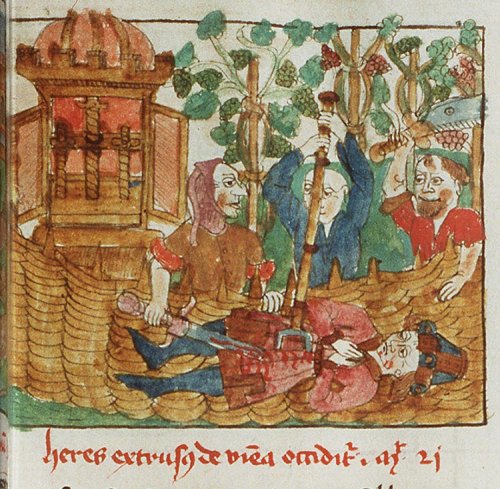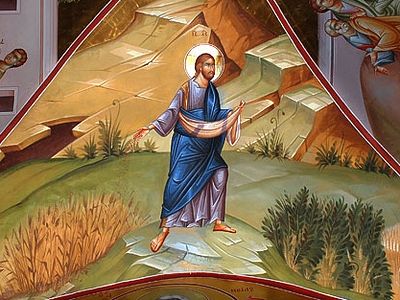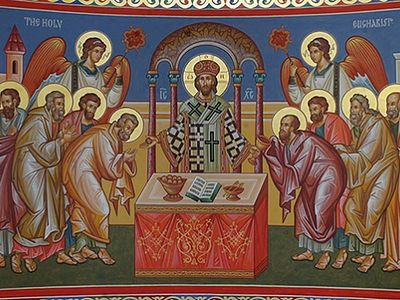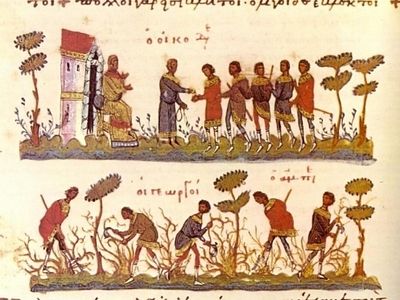
Matthew 21:33-42:
33 Hear another parable: There was a certain householder, which planted a vineyard, and hedged it round about, and digged a winepress in it, and built a tower, and let it out to husbandmen, and went into a far country: 34 And when the time of the fruit drew near, he sent his servants to the husbandmen, that they might receive the fruits of it. 35And the husbandmen took his servants, and beat one, and killed another, and stoned another. 36 Again, he sent other servants more than the first: and they did unto them likewise. 37 But last of all he sent unto them his son, saying, They will reverence my son. 38 But when the husbandmen saw the son, they said among themselves, This is the heir; come, let us kill him, and let us seize on his inheritance. 39 And they caught him, and cast him out of the vineyard, and slew him. 40 When the lord therefore of the vineyard cometh, what will he do unto those husbandmen? 41 They say unto him, He will miserably destroy those wicked men, and will let out his vineyard unto other husbandmen, which shall render him the fruits in their seasons. 42 Jesus saith unto them, Did ye never read in the scriptures, The stone which the builders rejected, the same is become the head of the corner: this is the Lord's doing, and it is marvellous in our eyes?
This whole parable is a story about the rejection of the Lord Jesus Christ Himself. The vineyard in it is God’s first chosen people of Israel. As says the Prophet Isaiah: For the vineyard of the Lord of hosts is the house of Israel (Is. 5:7). The owner of the vineyard is God, the vinedressers are the religious leaders of the people, and the servants who come to gather the harvest are the prophets sent by God. And, finally, the son is Christ the Messiah, sent as the final messenger into the world.
In the parable there is no other explanation for His death except that the husbandmen killed him, because they knew that He is the heir, that He is the Son of God—not because they didn’t know, but because they knew. Come, let us kill him, they say, and let us seize on his inheritance. What a simple solution to all the problems mankind has when he turns away from God!—from Cain to Caiaphas, from Caiaphas to the murderers of our holy Royal Family and to the very last murders who will walk the earth—remove the stone, just one, from the building of your life, and don’t worry about anything. Everything belongs to us now, and we do what we want. How simply and clearly the history and fate of Israel and of all mankind is shown in this parable!
Pay attention to how the merciful Lord relates to those to whom He has entrusted His vineyard. The Lord gives to His workers and leaves them alone. He doesn’t stand over them like some taskmaster. He entrusts then with that work which they are called to realize on earth. And we see also with what unfathomable patience again and again, despite all of our terrible sins and crimes, the Lord grants the possibility to respond to His trust and love. However, it doesn’t mean that the righteous judgment of God does not exist. All ends with the Lord, as we heard, bestowing death upon the evil laborers, taking the vineyard from them and handing it over to others.
Since the time of the coming of Christ a new vineyard of God has been spreading throughout the whole earth. The entire human race is included in this vineyard, and this new vineyard is the Church of Christ with the apostles, martyrs, hierarchs, confessors, preachers, right-believing kings and queens—those who worthily labor in the Lord’s vineyard. But ye are a chosen generation, a royal priesthood, an holy nation, a peculiar people, as the word of God tells us (1 Pet. 2:9). As the beautiful fruit of the salvific sowing, so the good husbandmen bring to the Lord their labor, and will do so until the end of the age.
However, the Lord’s parable is about evil husbandmen, and it concerns not only the Old Testament, but our whole Church is the Lord’s vineyard. Every human soul, say the Holy Fathers, is typified by the vineyard. And just as the owner of the vineyard in the parable received not even one handful of grapes, so does the Lord often receive no spiritual fruit from his many children, whom He loves. What sort of devastation has passed through our world in recent years? The devil himself has withered nearly the entire vineyard. And the Lord warns that it will be yet bitterer. The Son of Man, He says, is coming, and will He find at least one grape on earth?
Who will be guilty more than all in this? We know that ruler of this world increasingly asserts his power in this world, knowing that he has little time remaining, ever more raging, ever more asserting his domination—“the mystery of iniquity” of which the Apostle Paul speaks in his epistle to the Thessalonians (2 Thess. 2:7). But this mystery acts not only in the external world, say the Holy Fathers, but it touches upon the very Church, because in the very end the man of lawlessness, as the apostle says, will come into the church of God, and sitting down, make himself to be God (2 Thess. 2:4).
It is quite clear that, above all, those who have been charged by the Lord to labor for the cultivation of human souls must stand against the “mystery of iniquity”—those who are responsible before God for the spiritual condition of the people. And wherein will lie their fault? How can they come to the rejection of God Himself? Here the parable of the wicked husbandmen shows how terrible can be the growth of evil. The more the Lord shows mercy to the workers of the vineyard, the more they are hardened in their evil.
We see a number of cases of unjust judgments by the evil vinedressers before they killed the Son of the vineyard Owner. It all starts with a loss of the feeling of reality, a loss of the fear of God. Every person living the spiritual life can know that it’s possible to lose the fear of God and to lose grace, and to neglect that which is holy. The word of God says Cursed be he that doeth the work of the Lord with neglect (Jer. 48:10), and if a person is cursed it means he is void of grace; it means he follows the prince of this world and the forces of evil. He begins down the same path along which trod the wicked husbandmen.
To understand our responsibility, especially the responsibility of those to whom is entrusted the Lord’s vineyard, we must see that every detail of this parable is important. From the very beginning of the parable it is said that the Lord gave the workers a hedge, a tower, and a winepress for their work.
The winepress in a vineyard is where you get the juice and wine. According to the elucidations of the Holy Fathers, it is the mystery of the promised Messiah, of the true Savior of mankind, in expectation of Whom everyone in the Old Testament lived—and in anticipation of Whose Second Coming we now live. If any man thirst, let him come unto me, and drink (Jn. 7:37) says the Lord to such people. The tower, says the Holy Fathers, stands for the ancient Jerusalem Temple—the forerunner of the Church of Christ, where were rendered the prefiguring sacrificial offerings. It also stands for every parish of the Church of Christ. But it is also a watchtower, from which they watched and we should always keep a look out for approaching enemies, especially when it’s time for the fruit to ripen. This designation for the tower perhaps best of all helps us to understand how the “mystery of iniquity” is gradually completed in the Church. After all, the hedge which encompassed the vineyard exists for the same purpose. This wall is that which divides the vineyard from uncultivated land and which should protect it from thieves and wild animals. An unfenced vineyard is open to devastation. If the wall turns out to be damaged at some spot, then those who care about what happens with the vineyard will immediately try to fix it. And there exists a hedge in the spiritual life. As the Holy Fathers say, it’s the commandments of God. Above all, the proscriptive ancient law: do not kill, do not steal, do not commit adultery. These prohibitions do not oppress human freedom, as we know, but protect man, encompassing him, preserving his freedom. Without this wall man’s life becomes like a vineyard which herds of wild pigs could trample and devour. There are other walls in the Lord’s vineyard—the Mysteries of the Church, the Mysteries of Christ, before which we pray: “I will not speak of Thy Mysteries to Thine enemies,” as well as the dogmas and canons and all the prescriptions of the Church which we should be kept from any evil encroachment upon them.
When the vineyard workers have no care for the wall, then comes desolation and destruction. May no one think he’s just a layman, and nothing is expected of him. If you received the gift of the Holy Spirit then you are also a worker, no matter what place you occupy in the Church. And may no one say that he looks only after his own piety, and the rest is irrelevant to him. What does your piety mean if you don’t care that the whole vineyard is rotting before your very eyes? The Lord gives us the vineyard and always furnishes it with all necessities that we might worthily fulfill our main task. We are all invested with God’s trust, and we all freely use this gift as we see fit.
However, for each of us is coming the day when we must stand before the Lord to give account of what we did with that which He entrusted to us. We must all answer for it at the final and Dread Judgment of the Lord. And the choice, before which we now stand, as the Cross of Christ shows us, is the ultimate choice. In this world, languishing in evil, there exists evil and death. When evil utterly reveals itself, man becomes either a martyr or a murderer. Life leads to such an end such that no other choice will be given to anyone.
It is clearly seen in the parable that Christ knows what awaits Him ahead and what path His Church must walk. He consciously ascends to His death, to give Himself for the salvation of all, to become the cornerstone upon which life is built and without which all of mankind would bear witness to the destruction of all. Rejection and death await the Lord and His Church, but it is all in order to bring mercy, judgment, and victory for those who love Him.



